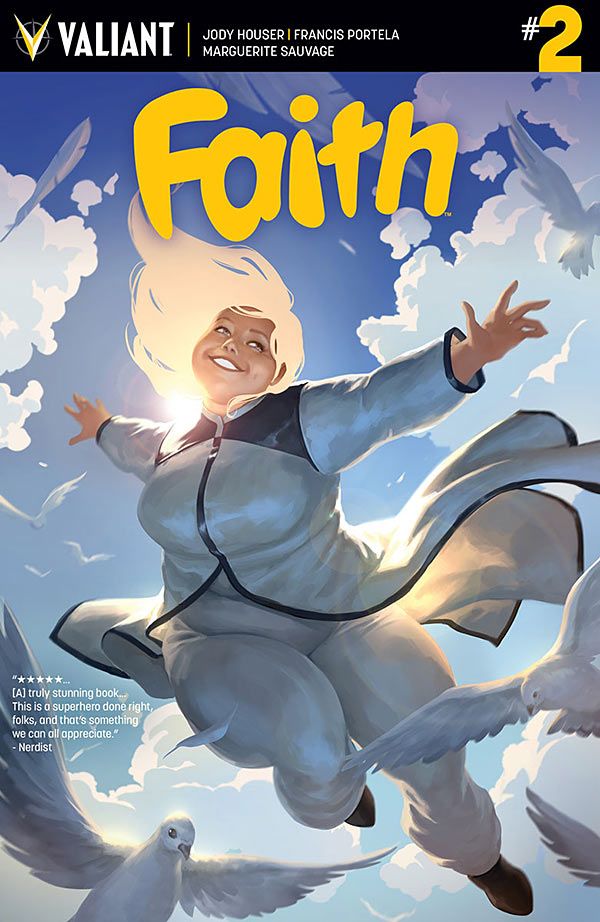After the triumph of the first issue, "Faith" #2 dives deeper into its likeable hero and her fully realized world. Like many second issues, this isn't a particularly memorable or mind-blowing installment, but it's a testament to the great world- and character-building that can take place in a series' more workmanlike issues. Jody Houser, Francis Portela and Marguerite Sauvage manage to make an otherwise cliche secret identity situation feel fresh and alive. They offer up an irresistibly strong character voice and sense of place. Though the plot is only moving along steadily, "Faith" just keeps on flying overall.
In both the dialogue and the narrative captions, Houser develops Faith's character in all its variety. From her vivid, gleeful fantasies to relatable, self-aware humor like "Why was I so determined to have a day job again? Something something adulting real world connections...", Faith always shows a funny sense of self. It adds a necessary lightness to her integrity and dedication. Indeed, Houser takes the complications a step further. This issue actually highlights the downside of Faith's solicitousness and empathy: she can be passive-aggressive. Faith's confrontation with Torque is neither direct nor effective. Her suggestions are veiled and her arguments are unconvincing. This scene brings interesting depth to what could easily be a bland character profile, and it shows serious thoughtfulness about how someone as responsible as Faith might fail herself or her friends.
Of course, aside from Faith's work and personal issues, there is a larger, more sinister plot going on. The reader learns more about the conspiracy against the psiots here, but it's still honestly the least interesting part of the series for me. Whereas Faith's personality and relationships have already begun to show their layers, the kidnap plot still feels generic. Further on, this could become a problem for "Faith," but I'm hopeful it will blossom into something more complex, given the approach to the other elements in the story.
Working on the "real life" scenes, Portela creates a solid sense of place for Los Angeles. He lets the city streets look believably west coast, and the in-flight splash pages capture the Hollywood hills, sprawling highways and desert-lite foliage. Colorist Andrew Dalhouse also leaves the lighting a little brighter and whiter, capturing the look of dry-heat sunshine. These small touches really add up, and I was surprised by how nicely the city takes shape.
Portela also zeroes in on the lines in his characters' faces, emphasizing their emotions with almost painfully detailed facial expressions. It can drive home everything from Faith's sadness to her boss's manic drive.
Sauvage's fantasy scenes are as ridiculously pretty, as her work always is. They work especially well in contrast with Portela's world, where the reader can see the worry lines and exhaustion in Faith's face. This gives Faith's otherwise funny fantasies some poignancy: with her glamorous hair, thick eyelashes and rosy, lineless cheeks, fantasy-world Faith looks so much more carefree.
Occasionally, however, the lettering and the art don't work well together. The reader is required to read right-to-left rather than left-to-right, or the word bubbles appear in confusing order. It's still decipherable, but it would make for an easier read if Portela, Sauvage and letterer Dave Sharpe could sync up more consistently in future issues.
Despite these small problems, "Faith" #2 keeps this series going strong. This has been an excellent read so far, and I can't wait to see where it goes next.

